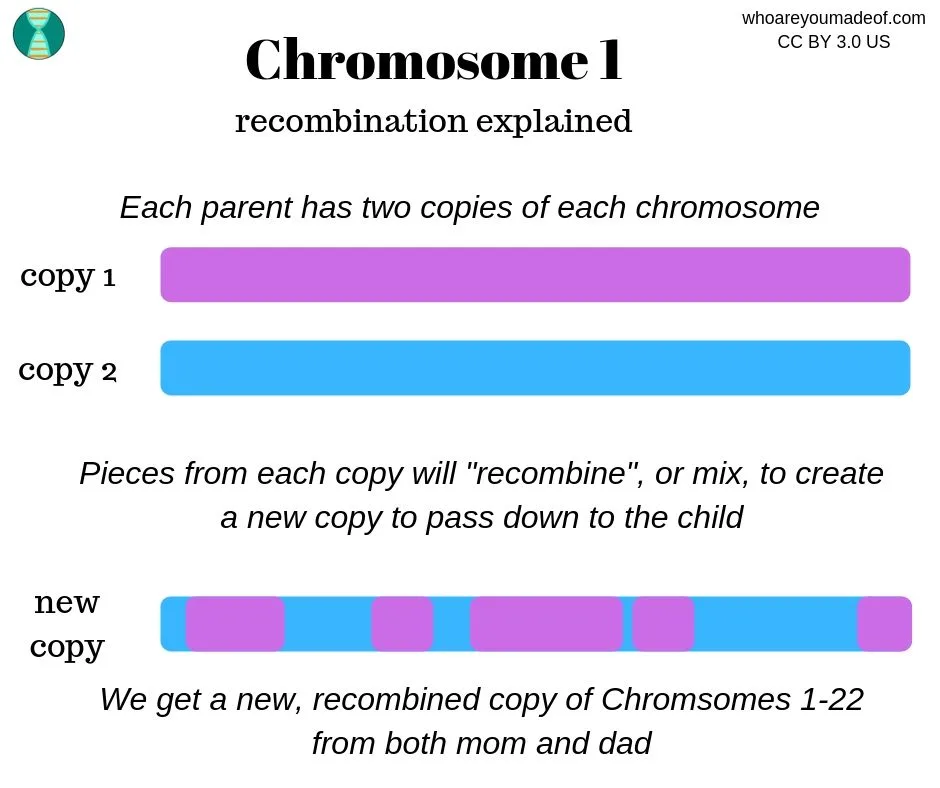Does DNA get "washed out" over time? If it does, how does the process work? In this post, you will find the answers to these questions, plus:
- How many generations does DNA go back
- How much DNA you inherit from your ancestors
- Whether DNA can skip a generation
On DNA discussion boards, I see the expression "washed out" or "watered down" used frequently when people discuss why someone might not have inherited an ethnicity region from an ancestor.
It is also used to describe the common situation where two distant cousins share no genetic material.

Is it true that DNA from your ancestors gets washed out over time?
While DNA doesn't truly "wash out" in a literal sense, DNA passed down from our ancestors was "diluted" with the DNA from other ancestors. In this way, it is true that genetic material from distant ancestors is "watered down" over time and will not show up as intensely in our DNA results as DNA from our recent ancestors.
For example, if I know that my 6th great-grandmother was Irish, I might be expecting to see a certain percentage of Irish DNA in my ethnicity estimate (or ancestry estimate, as it is sometimes called). If I don't see any Irish in my results, I can assume that the amount of Irish DNA that I inherited from her was too small to show up in my results.
In other words, the DNA that my 6th great-grandmother passed down to her child (my ancestor) was mixed with other DNA each generation, effectively "washing out" by the time it got to me.
How does DNA "wash out" over time
If it's true that DNA can get "washed out", how does this process occur? It happens through a process called "recombination".
Every child inherits 50% of their DNA from their mother and 50% from their father. The DNA passed down from their parents is in the form of one copy of each of their 22 chromosomes from each parent, and a sex chromosome from each parent.
To make this explanation simpler to understand, let us narrow our discussion to the DNA that a child inherits from their mother. For this purpose, the process is identical to DNA inherited from the father, with the single sex chromosome being the exception.
Each chromosome that the child inherits from their mother will be a "recombined" version of their mother's two copies of that chromosome. For example, your mother has two copies of Chromosome 1, inherited from each of her parents (i.e. your grandparents).
When you were born, you got a copy of Chromosome 1 from your mother and another copy from your father. The copy of Chromosome 1 that you got from your mother was made up of a mixture of your mother's two copies of Chromosome 1.

The recombination process, which can be imagined as "mixing" two copies of the same chromosome, randomly chooses pieces of DNA from each copy to create a brand-new, completely unique copy of that numbered chromosome.
These "pieces" of DNA that form our new copies of our chromosomes are made up of smaller pieces of DNA called DNA segments. These DNA segments were inherited from our more distant ancestors.
Since the size of Chromosome 1, and every other chromosome, is limited, the mother can only pass down 50% of her two copies of Chromosome 1 to her child - i.e. you. This is how some DNA is "lost", or "washed out", over time - some DNA is not passed down to the next generation.
The process of recombination occurs each generation, with DNA being randomly selected to get passed down. These are the events that create our completely unique genome.
The visualization below is a simplified example of how the DNA that two first cousins sharing two grandparents inherited vastly different DNA from their common ancestors. It should help you understand how some ethnicity regions, the top reason that people are curious about DNA being "watered down", disappear from DNA over time.

Imagine that Nicole and James start their own families and the trend of DNA inheritance continues. How much DNA will their children share with the grandparents of Nicole and James? How much DNA will their descendants share with each other?
The "washing out" of DNA also affects how much DNA we share with our distant cousins.
How many generations does DNA go back?
Since now we understand more about how DNA from some of your ancestors really does, get washed out or watered down over time, the logical question to ask next is:
How many generations back does DNA go?
There is no hard and fast answer that applies to everyone, but there are a few things that we do know for sure. For example, we will always inherit substantial percentages of DNA from:
- parents (50%)
- grandparents (about 25%)
- great-grandparents (about 12.5%)
- great-great grandparents (about 6.25%)
- great-great-great grandparents (about 3.125%)
Going back further than great-great-great grandparents, we should understand that while we inherited DNA from many of those ancestors, the size of the segments and amount of total DNA inherited from any given distant ancestor will vary greatly.
At a certain point, it is theoretically possible to have inherited no DNA from any given distant ancestor. Of course, this will always be a "theory" that we know is true, while not provable because we can't have all of our distant ancestors take autosomal DNA tests.
For example, there is about a 5% probability that you will share no DNA with a great-great-great-great-great grandparent. This might initially seem odd - how can you possibly not have inherited DNA from an ancestor only seven generations back in your tree?
When you imagine that you have 128 great-great-great-great-great grandparents, it might be easier to visualize how mathematical probability and the limited size of the human genome affects percentages of DNA shared with these ancestors.
Can DNA skip a generation?
If you didn't see what you were expecting in your DNA results, you might wonder if the ethnicity region perhaps skipped a generation.
In reality, it is not possible for DNA to skip a generation. 100% of the DNA that any given person has was inherited from either of their parents, which means that we can't inherit any DNA that our parents didn't have.
The same is true for any other generation in our ancestry. For example, our parents couldn't pass anything down to us that their parents didn't have, and
Conclusion
I hope that this post helped you learn more about the concept of DNA getting "washed out" or "watered down" over the passing of time and generations.
If you have any questions about something that you read in this post, or would like to share your own experience about DNA being "watered down", I would love to hear from you in the discussion below.
Thanks for stopping by today!


Jeff
Wednesday 14th of December 2022
Based on my visual phasing at the great grandparent level and my minimal DNA matches along one particular branch I can say with confidence I would barely match one of my 2nd great grandfathers if I could test his DNA. My 1C2R who descends from him only matches me at about 32 cM but matches my dad around 400. I only inherited about 17.5% of my DNA from my grandparent along this line and 4% of my great grandparent. These numbers are closing in on the 0% chance range but I can show they’re possible.
Glenn
Wednesday 31st of August 2022
Both myself, my wife and our son have had ancestry dna done. I show 26% germanic my wife shows 5% germanic however my son shows 30% germanic from 1 parent only, how is this possible?
Michael Prince
Tuesday 23rd of August 2022
I caught this late. But a very well explanation for the rookies in Ancestry. It eloquently points out how things go. About 10 years when I started genealogy and my quest, I was clueless. Over the years of course the cluelessness changed to getting pretty good at research. Again, great article!
Debbie
Thursday 11th of August 2022
My son's DNA shows him to have 6% Scotland, yet I have 0%. We have been able to edit his maternal and paternal sides as they are vey different. How can he inherit something from me that I don't have?
Patricia Damiral
Friday 25th of March 2022
I thought I would have Irish DNA as both my mother and my grandfather were Irish. Why do I not have any?
Pam Naylor
Tuesday 21st of June 2022
@Patricia Damiral, I have a similar problem. My grandfather was Irish, but I have only 4% Irish DNA. My son has none. Have you gained any explanation from any source? Best wishes, Pam.